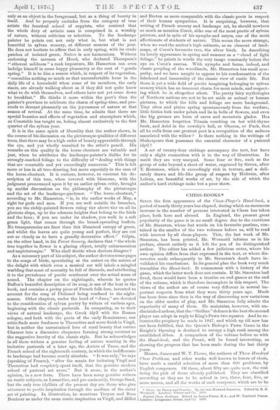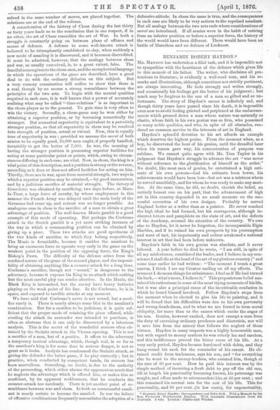CHESS-BOOKS.*
&UWE the first appearance of the Chess-Player's Hand-book, s; period of nearly thirty years has elapsed, during which an enormous increase in the number of persons interested in Chess has taken. place, both here and abroad. In England, the present great popularity of the game is in no small degree due to the exertions of Mr. Staunton, whose last words on his favourite pastime, con- tained in the smaller of the two volumes before us, will be read with interest by all chess-players. This, the last work of Mr. Staunton, has been printed, Mr. Wormald informs us in his. preface, almost entirely as it left the pen of its distinguished author. The editor has added a few judicious notes, where his. own opinion differs from that expressed in the text, or where dis- coveries made subsequently to Mr. Staunton's death have in- validated his conclusions. In its general plan the book very much resembles the Band-book. It commences with a history of the game, which the latter work does not contain. If Mr. Staunton had lived, there would have been a treatise on end-games at the end of the volume, which is therefore incomplete in this respect. The views of the author are of course very different in several im- portant respects from what they were thirty years ago. Much. has been done since then in the way of discovering new variations on the older modes of play, and Mr. Staunton fully admits the superiority of many of them. He maintains, however, with un- diminished ardour, that the " Sicilian " defence is the best the second player can adopt in reply to King's Pawn two squares. And he re- iterates the prophecy he made in 1847, and which up till now has. not been fulfilled, that the Queen's Bishop's Pawn Game in the Knight's Opening is destined to occupy a high rank among the established debuts. A comparison of the volume before us with the Hand-book, and the Praxis, will be found interesting, as. showing the progress that has been made during the last thirty-
years. 8
Messrs. James and W. T. Pierce, the authors of Three Hundred Chess Problems, and other works well known to lovers of chess, have made a careful selection of more than 600 problems, by English composers. Of these, about fifty are quite new, the rest being the pick of those already published. They are classified according as they are to be solved in two, three, four, five, or more moves, and all the works of each composer, wh ich are to be • Chess: its Theory and Practice. By the late Howard Staunton. Edited by B. B. Wormald. London: Virtue and Co. 1876, English Chess Problems. Edited by James Pierce, MA., and W. Timbrell Pierce. London: Longmans, Green, and Co. 1576.
solved in the same number of moves, are placed together. The solutions are at the end of the volume.
A consideration of the history of Chess during the last thirty or forty years leads us to the conclusion that in one respect, if in no other, the art of Chess resembles the art of War. In both a struggle is constantly going on between plans of offence and means of defence. A defence to some well-known attack is believed to be triumphantly established to-day, when suddenly a new mode of assailing it is discovered, and it becomes discredited. It must be admitted, however, that the analogy between chess and war, as usually conceived, is, to a great extent, false. The fanciful names given to the chess-men, and the metaphorical language in which the operations of the game are described, have a good deal to do with the ordinary delusion on this subject. But a very- cursory examination will suffice to show that there is a real, though by no means a strong resemblance between the principles of the two arts. To begin with the mental qualities required in each case, it is well known that a power of accurately realising what may be called "time-relations" is as important to the chess-player as to the general. To gain time is very often to win the victory. Secondly, a chess-game may be won either by obtaining a superior position, or by becoming numerically the stronger. But numerical superiority is equivalent to a potentially stronger position, so that all superiority in chess may be resolved into strength of position, actual or virtual. Now, this is equally true of superiority in war ; provided we assume the moral of both armies to be equally good, 10,000 men ought, if properly handled, invariably to get the better of 7,000. In war, the meaning of having the stronger position is possessing superior facilities for acting at some particular point or points, which, owing to circum- stances differing in each case, are vital. Now, in chess, the king is a vital point of this description, and a position is strong or the reverse, according as it does or does not afford facilities for acting on him. Thirdly, there are in war, apart from material strength, two ways in which a superior position may be obtained,—by good manceuvres, and by a judicious sacrifice of material strength. The victory of Gravelotte was obtained by sacrificing, two days before, at Mars- la-Tour, a large force of cavalry, by whose employment in this manner the French Army was delayed until the main body of the Germans had come up, and retreat was no longer possible. An analogous case in chess is the sacrifice of a man to obtain a great advantage of position. The well-known Muzio gambit is a good -example of this mode of operating. But perhaps the Cochrane attack in the Scotch gambit is a yet more striking instance of the way in which a commanding position can be obtained by giving up a piece. These two attacks are good specimens of the two kinds of sacrifice to which they belong respectively. The Muzio is formidable, because it enables the assailant to bring an enormous force to operate very early in the game on the weakest point in the position of the opposing- force, the King's Bishop's Pawn. The difficulty of the defence arises from the confined nature of the game of the second player, and the impossi- bility of obtaining anything like a counter-attack for a long time. Cochrane's sacrifice, though not "sound," is dangerous to the adversary, because it exposes his King to an attack which nothing but the most careful play can render abortive. In the Muzio, the Black King is intrenched, but the enemy have heavy batteries playing on the weak point of his line. In the Cochrane, he is in apace, and exposed to terrible attacks at any moment.
We have said that Cochrane's move is not sound, but a sacri- fice rarely is. There is nearly always some blot in the assailant's combination. But for a sacrifice to be judicious, it is quite suf-. ficient that the proper mode of retaining the piece offered, while evading the attack its surrender was intended to purchase, is often so abstruse that it can only be discovered by a laborious analysis. This is the secret of the wonderful success often ob- tained by the Steinitz attack in the Vienna opening. This is not a sacrifice of a man, but of a position. It offers to the adversary a temporary tactical advantage, which, though real, in so far as the assailant's king is for some time in serious danger, is not so great as it looks. Analysis has condemned the Steinitz attack, as giving the defender the better game, if he play correctly ; but in practice, when conducted by competent hands, its success has been marvellous. Something, no doubt, is due to the audacity of the proceeding, which either alarms the opponent so much that he neglects the advantage which is offered him, or makes him so tonfident, by its apparent recklessness, that he conducts the counter-attack too carelessly. There is yet another point of re- semblance between war and chess. In both an unsuccessful assail- ant is nearly certain to become the assailed. In war the failure of offensive combinations frequently necessitates the adoption of a defensive atitude. In chess the same is true, and the consequences in each case are likely to be very serious to the repulsed assailant. But all analogy between the two arts ends where considerations of moral are introduced. If all armies were in the habit of retiring from an inferior position or before a superior force, the history of the world would have been different. There would have been no battle of Marathon and no defence of Luelmow.



































 Previous page
Previous page